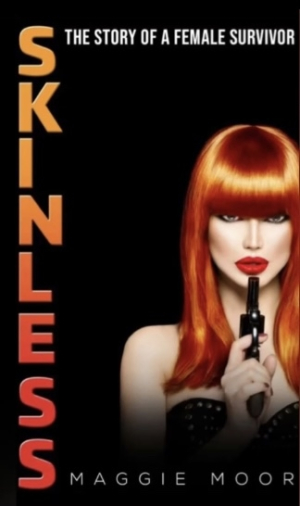
Skinless
The Story of a Female Survivor
Skinless is an eloquent crime novel about a woman’s relentless desire to survive.
In Maggie Moor’s provocative novel Skinless, a woman views crime and ambition from within New York City’s dark spaces.
After growing up in a dysfunctional family, Charmay leads a dangerous life. Her stepfather molested and abused her, leaving her with trauma and a bleak outlook. In adulthood, she is directed by despair, but also by her ambition to make something more of herself. Though she’s cynical, she sets out to make her way in late 1990s New York City, where she dates a marijuana kingpin, works as an exotic dancer, and falls in with a rich lecher. The latter relationship descends into chaos involving street-level crime, sexual obsession, and, most dangerous of all, love.
Charmay narrates, and her voice is lively: the world is seen through her eyes, and everything in the book is about her. A tragic but powerful woman, she is a survivor first; although she makes disastrous decisions, such as to become the plaything of a “sugar daddy,” she manages all of the horrors she encounters through her sheer toughness.
Charmay’s involvement in criminal enterprises becomes secondary to her jaded, philosophical view on life, which is featured in lieu of an organized plot. Her perspective is shown in short, thematic chapters, like “Lower East Side, New York,” which covers her gritty neighborhood and the characters who inhabit it, and “Ammo,” which is potent as it digresses to consider the violent paranoia of a drug dealer. Each chapter features black humor and acerbic commentary, providing context to the crimes that Charmay partakes in or observes.
Most of the book’s sentences vacillate between beauty and despair. Charmay expresses euphoria, sadness, anxiety, and anger as she shows off her raw will to live. Because the book is more a character study than anything else, her struggles with her older lover are rendered secondary to her street poetry, in which the city’s colors and sensations are highlighted in lush, sensual language. Commentary on the bygone days of New York City comes in, too, revealing it as a city ruled by people living on the margins, like Charmay. Admiration for her builds in time with disgust for the ways in which cities and their inhabitants can destroy beauty.
The book’s conclusion is loud about asserting its central message: that traumatized people are neither weak nor victims, but rather are the rare few tough enough to thrive in ruins. Charmay is no hero, but her story of love, loss, violence, and struggle transcends her personal limitations.
A humane portrait of often inhuman actions, Skinless is an eloquent crime novel about a woman’s relentless desire to survive.
Reviewed by
Benjamin Welton
Disclosure: This article is not an endorsement, but a review. The publisher of this book provided free copies of the book and paid a small fee to have their book reviewed by a professional reviewer. Foreword Reviews and Clarion Reviews make no guarantee that the publisher will receive a positive review. Foreword Magazine, Inc. is disclosing this in accordance with the Federal Trade Commission’s 16 CFR, Part 255.
